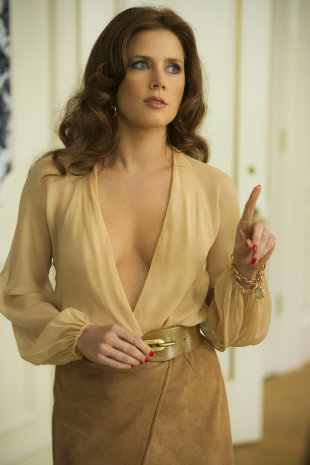This is why I love the Alamo Drafthouse so much. I was sitting in my seat watching the closing credits. The usher/waiter came over and asked me, “Was everything okay? Did you have any issues?” And I told him, kind of jokingly, “The only issue I had is that I can’t get these darn pens to write.” (There’s pens at each seat that you use to write down your order.)
And the guy smiles at me, says “Here. Go see a movie on me.” and hands me a free pass. When was the last time this happened to you?
===
I liked “American Hustle” a little better than “The Wolf of Wall Street” for two reasons. Namely, these two:
Ms. Adams is wonderful. As are her costumes. I could stare at her all day long (or at least until she said “Stop staring at my cleavage”) and would happily take her out for the usual cheeseburger and house red.
Christian Bale completely disappears into the role of an overweight balding scam artist, and Bradley Cooper is fine as his FBI handler. “Hustle” is a perfectly fine way to spend a little over two hours. (At least it is fairly efficient in its storytelling, with no digressions about Quaaludes.) It even has a redemptive arc. So why don’t I have warmer feelings about the movie? Idiosyncratic personal reasons, which you can agree or disagree with.
There is a school of criticism that says you should judge the movie based on what’s on the screen, not the background or the subtext or even how closely it sticks to real events, even if it claims to be “based on a true story”. I mostly agree with this school of thought, but as I get older and Hollywood turns out more “based on a true story” movies, I start to think that it is fair to judge a movie that makes that claim, at least in part, on how closely it sticks to the facts. I don’t think that should be the only factor, but I do believe it is fair to say, “Look, the people behind this movie changed X, Y, and Z, their reasons for doing so aren’t convincing, and I think these changes make the movie weaker.”
“American Hustle”, to be fair, does not claim to be “based on a true story”. David O. Russell states up front that “Some of this actually happened”. And it is arguably fair for him and for the writers to deviate some from the real story behind Abscam.
My problem is that I read Robert Greene’s The Sting Man: Inside Abscam last week (in addition to having lived through Abscam) so the real story is fresh in my mind. And I had problems with the choices Russell made.
Specifically, I didn’t buy into the whole love triangle between Richie DiMaso (the FBI agent), Irving Rosenfeld (the Bale character) Sydney Prosser (the Amy Adams character, who starts out as Rosenfeld’s mistress). Other than Sydney wearing dresses slit down to waist level, what is the reason for the engaged DiMaso to fall so hard for her, hard enough to endanger his career? (In the real world, the Rosenfeld character’s mistress was nowhere near as heavily involved in Abscam as “Prosser” was; the Rosenfeld character got her off the hook as a condition for participating in the operation.)
What happens between the three of them sets up a nice twist ending that gives us catharsis; but the catharsis wouldn’t have been needed without that peculiar choice, which seems to have been motivated primarily by the desire to show off Amy Adams’ cleavage. (I won’t give away the twist in case you haven’t seen the movie, but in reality? Nothing even remotely close to it happened.)
Maybe I’m wrong, or maybe I’m being unfair to the movie. But I think Russell could have made just as good a movie by sticking closer to the true story, while still working in Ms. Adams and her spectacular cleavage.
